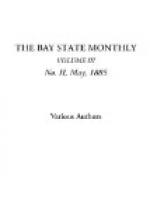These were prophetic words; and they were spoken by a man born in the slave State of Kentucky. It was the truth, the fearless truth, uttered in advance of even the acknowledged leader of the Republican party, Governor Seward, of New York. The simple assertion of that truth cost Lincoln a seat in the United States Senate; but it set other men’s minds to thinking, and in 1860 the people, following the path made through the forest of error by a pioneer in the cause of truth, came to similar conclusions, and made “Honest Old Abe” Chief Magistrate of the republic.
On the 10th of May, 1860, the Republican convention of Illinois met at Decatur, in Macon county, to nominate State officers and appoint delegates to the National Presidential Convention. Decatur was not far from where Lincoln’s father had settled and worked a farm in 1830, and where young Abraham Lincoln and Thomas Hanks had split the rails for enclosing the old pioneer’s first cornfield. Mr. Lincoln was present, simply as an observer, at the convention. Scarcely had he taken his seat when General Oglesby arose, and remarked that an old Democrat of Macon county desired to make a contribution to the convention. Two old fence rails were then brought in, bearing the inscription: “Abraham Lincoln, the rail candidate for the Presidency in 1860. Two rails from a lot of three thousand, made in 1830, by Thomas Hanks and Abe Lincoln, whose father was the first pioneer of Macon county.”
The effect of this contribution can well be imagined: at once it became useless to talk in Illinois of any other man than Abraham Lincoln for President.
On the 16th of May the National Republican Convention was called together in Chicago. The convention met in a large building called the “Wigwam,” which had been constructed specially for the occasion. The contest for the nomination lay between William H. Seward of New York and Abraham Lincoln of Illinois. On the third ballot, as we know, the latter was nominated. I was but a youth on that memorable day, but I vividly recollect that I was standing, with other urchins, nearly opposite the “Wigwam,” and was startled when a man stationed on top of the building yelled out, “Fire: Lincoln is nominated!” Then followed the roar of cannon and cheers upon cheers.
When the news reached Mr. Lincoln he was chatting with some friends in the office of the “Sangamon Journal,” in Springfield. He read the telegram aloud, and then said: “There is a little woman down at our house who will like to hear this. I’ll go down and tell her.” The “little woman” was his wife, whom, as Mary Todd, he had won in 1842, and he knew that she was more anxious that he should be President than he himself was.




